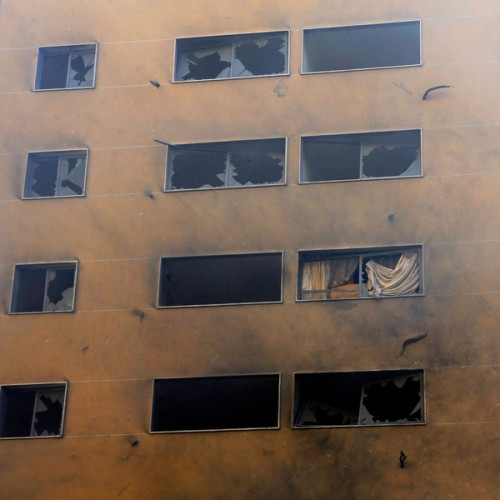“Open for Lebanese Only”: Displaced Migrant Workers [in Beirut] Left With Few Options
When the school where she works as a janitor was converted into a shelter for displaced people, Ababa suddenly found herself out of a job and a place to sleep. “It’s open for Lebanese, only,” she said, forcing her and her friend Hanna to sleep in a park in downtown Beirut since the massive Israeli bombardment in Haret Hreik September 27 which killed Hezbollah Secretary-General Hassan Nasrallah and a still unknown number of civilians.
The two women, originally from Ethiopia, had been living in the neighborhood of Bir Hassan in Beirut’s southern suburbs before the attack. They say no one from the Lebanese government, the United Nations, or their own consulate has made an effort to check on them.
“We didn’t bring our stuff or anything,” Hanna said. “Yesterday, we tried to go back to get our things and they started bombing.” They decided it was too dangerous and turned around halfway there. They have almost nothing on them — no money, no spare clothes, and nowhere to charge their phones or use the bathroom.
“We went to a church, we’re Christians. They closed it and told us to go to the consulate,” Hanna said, adding that no one from the consulate was answering their phone calls. They haven’t found a shelter that will take them in.
Nearby, in the same park, Nour Zahan and Rena, two women from Bangladesh, sat on the ground waiting for their circumstances to change. They, too, left Beirut’s southern suburbs on the day of the same series of air strikes, but no one at the Bangladeshi embassy has returned their calls. They’ve tried to find shelter from the rain and sun in the schools and other formal shelters that have taken in over 162,000 displaced people, but were told either that facilities are full or that “Bangladeshis are forbidden,” before being brusquely shooed away. The women say they would jump at the chance to evacuate, but cannot afford the airfare back home without the help of their governments.
Lebanon is home to 176,000 migrant workers, who are especially vulnerable amid the ongoing Israeli war. Many are semi-formally excluded from the government’s emergency plan and lack the family networks that many Lebanese are using to secure shelter amid displacement. The International Organization for Migration estimates 46 percent of the displaced are being hosted, rather than renting or staying in a collective shelter.
Michael Petro, a project director with the Jesuit Refugee Service (JRS), helps run one of the few shelters that has taken in migrant workers. The 64 people currently residing at the Saint Joseph Church in Monot, which has long operated as a migrant worker community center, have access to a well-supplied, clean space. The site, however, is at capacity, and despite the heroic efforts of the shelter staff to find newcomers alternative shelters, they are unable to help everyone.
It started on Tuesday, September 24, when a large group of Sudanese families, who had traveled overnight from Nabatieh by foot and motorcycle, arrived at the church. Up until then, the church had no plans to become a shelter. Petro’s team tried to find them a place to stay. “Our social workers called every shelter in the country, every single one,” he said, and only found one place willing to take non-Lebanese. They rented buses but, before the buses even left Monot, the shelter rescinded the offer. “So that’s how we became a shelter… Thank God we happened to have 100 mattresses in the basement of a nearby building.”
When they realized that they couldn’t take any more people, workers at the Saint Joseph Church sent a group of 70 women from Sierra Leone and Bangladesh by bus to a shelter they identified in Tripoli. While the shelter initially accepted the women, as promised, they were evicted the next morning by the Tripoli municipality and General Security. They are now back in Beirut, sleeping on the streets.
“We had the confirmation from the government that they would take them,” Petro said, “and then a different part of the government had them removed.”
Malika Jumaa, a Sudanese woman living in south Lebanon, is staying at Saint Joseph’s. She spent the first night of her displacement sleeping under the Cola bridge in Beirut, after making the arduous journey from the South. She then heard about the shelter from a WhatsApp group, and quickly made her way there. “Thank God, it’s better than being in other places,” she told The Public Source, adding that she is concerned for people still on the street. She doesn’t plan to return to Sudan, citing the ongoing war. Her parents disappeared in the violence there years ago, leaving her with no family to return to.
On Wednesday night, JRS opened a second shelter, outside Beirut.
Update: Since conducting these interviews on October 2nd and 3rd, security forces forcibly evicted people from the park, scattering them to other locations, on Sunday night.
Richard Salame is an investigative journalist at The Public Source.
Marwan Bou Haidar is staff photojournalist at The Public Source.
Get Involved
If you'd like to help with maintaining or developing the website, contact us.
Publish
Publish your stories and upcoming events on Indybay.



